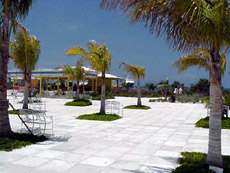Brian's complexity

Labadee beach, on a peninsula on the north shore of Haiti (Photo by Doug Terhune used with permission of SeaLetter Cruise Magazine)

Dining area at Half Moon Cay (Photo by Alan Walker used with permission of SeaLetter Cruise Magazine)

Beach activities at Half Moon Cay (Photo by Alan Walker used with permission of SeaLetter Cruise Magazine)
Here is a way into the issue of complexity. A reporter disdained the tourists' acceptance of the isolation of the fantasy islands from wider history.
Brian, from Tallahassee Florida . . . pronounces [CocoCay] the highlight of their trip. "It's a lot like Labadee, which we visited on another . . . ship a few years ago," he says, "Both are the kind of places you imagine the Caribbean is like: a big beach, beautiful water. Guys bringing drinks right to your beach chair." . . . Brian seems unconcerned that his trip to Labadee coincided with Haiti's suffering under the military junta that overthrew popularly elected President Jean-Bertrand Aristide. "Yeah, I guess there was a wall or something to keep people out, or otherwise maybe some Haitians would have caused trouble," he says. "But everything was fine." Patron 1998, 95
The case is not so straightforward. Must Brian be aware at every moment of the situation in Haiti? Suppose he spends his whole working life dealing with such situations, can't he get away now and then? Certainly, but the fear is that his whole life avoids such situations. That's a legitimate worry but then the island is only a symptom of a larger problem.
We can ask, though, even granting that Brian could legitimately need to get away from his day-to-day problems, is this the place he should do it? Certainly placing Labadee on a peninsula of Haiti is more degrading than putting the fantasy on some unoccupied reef. Would it be less objectionable if the Caribbean dream were constructed on an island off the Georgia coast? Of course then it would be harder to hide the fact that you were in a USA fantasy rather than the real Caribbean. But this shows that the issue is lived complexity and awareness of context.
Namely: To what degree do the effects of these islands depend on the participants forgetting that they are a fantasy? Can the fantasy survive the awareness of what it is? We can enjoy living a fantasy in Disneyland and knowing what we are doing; the awareness doesn't destroy the experience. It looks as if Brian's island experience wouldn't work if Brian didn't think that he was meeting the real Caribbean, or at least the way the real Caribbean ought to be. It is getting in touch with that supposed Other that gives Brian the space to stop being his usual workaday self. He needs the feeling of being in the presence of the Other, but the real Caribbean Other would destroy the fantasy by being both too familiar and too foreign. The issue that's being raised here is, then, complexity, the value of awareness of a place's inner complexities and fuller context, which includes our complicity in its manufacture.